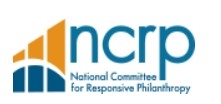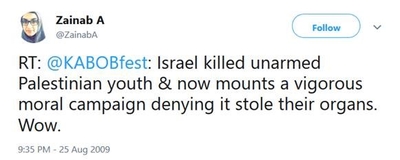
“What’s the one thing you want funders to do differently to support the pro-immigrant and -refugee movement?”
This is the question posed by the National Committee for Responsive Philanthropy (NCRP) on Monday to highlight the organization’s members.
The NCRP claims to promote “philanthropy that serves the public good, is responsive to people and communities with the least wealth and opportunity, and is held accountable to the highest standards of integrity and openness.”
It’s difficult to see how NCRP lived up to that standard when it showcased two Islamist activists with a history of bigoted and anti-Semitic views: Zainab Arain and Abbas Barzegar. Both work in the Council on American-Islamic Relations’ (CAIR), research and advocacy department, which Barzegar directs and Arain serves as manager.

Arain has peddled anti-Semitic conspiracies suggesting Israel harvests dead Palestinians’ organs, akin to a modern-day blood libel. She has promoted articles from fringe and conspiratorial websites promoting the anti-Semitic view that Israel controls U.S. foreign policy.
So how did the CAIR officials respond to NCRP’s question?
They “simply ask that funders commit to divesting from anti-human agendas: Those that advocate separation of families, ethnic and religious bigotry, and toxic political discourses.”
Unfortunately, NCRP needs to be held accountable for highlighting two Islamist activists that have a history of making radical comments and work for an organization that propagates anti-Semitic views.

In 2009, Arain shared a report from Iran’s Press TV that the U.S. and Israel finance the Taliban and other terrorists. “Is it surprising?” she asked. Yeah, and it’s entirely false, too. What’s surprising is someone who now is treated credibly by NCRP bought into raw propaganda from Iran’s state-run media. Meanwhile, she openly defends Palestinian terrorists trying to kill Israelis and voiced disdain for pro-Israel supporters.Abbas Barzegar, CAIR’s research and advocacy director, similarly shared conspiratorial and discredited claims, including that the Coptic Egyptian creator of an anti-Islamic video was an Israeli citizen. Barzegar also praised the 2009 re-election of former Iranian president, and Holocaust-denier, Mahmoud Ahmadinejad.
“For over a week the same social impulses of anti-corruption, populism, and religious piety that led to the revolution have been on the streets available to anyone who wanted to report on them,” Barzegar wrote. “Ahmedinejad, for most in the country, embodies those ideals.”
In May, CAIR released a co-authored report by Arain and Barzegar which tried to identify and embarrass philanthropic institutions that fund the so-called “Islamophobia Network.” This “network” includes legitimate research institutes that conduct reputable work and highlight the threat from Islamist ideologies worldwide. It included the Investigative Project on Terrorism (IPT), though it offered no evidence to support the smear. IPT has spent years documenting CAIR’s ties to a Hamas-support network and exposing the extreme views expressed by many of its leaders. CAIR seems to believe its most effective defense is to attack the messenger.
The Islamophobia report, meanwhile, is full of inconsistencies and serious falsehoods.
Barzegar and Arain also published an article last month featured on NCRP’s site entitled: “Philanthropy Must Exclusively Support Causes That Indicate a Love of Humanity.” It is ironic that activists with a history of sharing bigoted views think that they are in a position to dictate the use of charitable donations.
It should not be surprising that CAIR officials are pressuring others on how to allocate their donations or support. In April, the organization devoted considerable attention to pressuring Congress to oppose the “Anti-Semitism Awareness Act of 2019.”
The Act directs the Department of Education to adopt the International Holocaust Remembrance Alliance (IHRA)’s working definition of anti-Semitism, which the State Department embraced in 2016.
Elements of this working definition encompass modern anti-Israel sentiment that “crosses the line into anti-Semitism.” That includes denying the Jewish people’s right to self-determination, claims that Israel was founded as a racist entity, and applying double standards against Israel not expected of other democracies.
CAIR is worried that if the U.S. Department of Education adopts this definition, U.S. Islamist groups will be inhibited in their efforts to stoke anti-Israel sentiment on college campuses and in other political debate.
These bigoted views are similarly driving CAIR to pressure philanthropists to divest from the Jewish state and cease supporting research institutes that highlight Islamism’s problematic aspects or support Israel’s right to defend itself.
This is not the first time a seemingly benign philanthropic organization has honored a radical CAIR member.
In October, anti-Semitic CAIR official Zahra Billoo received the Community Builder Award from People Acting in Community Together (PACT). Billoo has repeatedly spewed divisive rhetoric, drawing a line in the sand between who is a legitimate Muslim leader and who is not. For Billoo, one cannot be a Muslim leader or activist while opposing a boycott campaign targeting the world’s sole Jewish state.
Like Zainab Arain and other U.S.-based Islamists, Billoo often rails against supposed “Zionist influence” in the United States.
This sentiment is expected of Billoo who, like other U.S. Islamist figures, consistently opposes any type of engagement or interfaith dialogue with organizations that maintain ties to Israel.
Advocating for sanctions and boycotts targeting Israel, while avoiding similar calls against other states who violate human rights on a far larger scale, is a double standard that amounts to anti-Semitism. It is the same type of anti-Semitism CAIR and its officials repeatedly propagate.
National community and philanthropic organizations that seek to make the world a better place diminish their own work by spotlighting U.S.-based Islamists and anti-Semites. Hate mongers and conspiracy theorists are the last people who should be advising how charities and philanthropists allocate their donations.
This column was originally published at the Investigative Project on Terrorism.
The views expressed in CCNS member articles are not necessarily the views or positions of the entire CCNS. They are the views of the authors, who are members of the CCNS.
